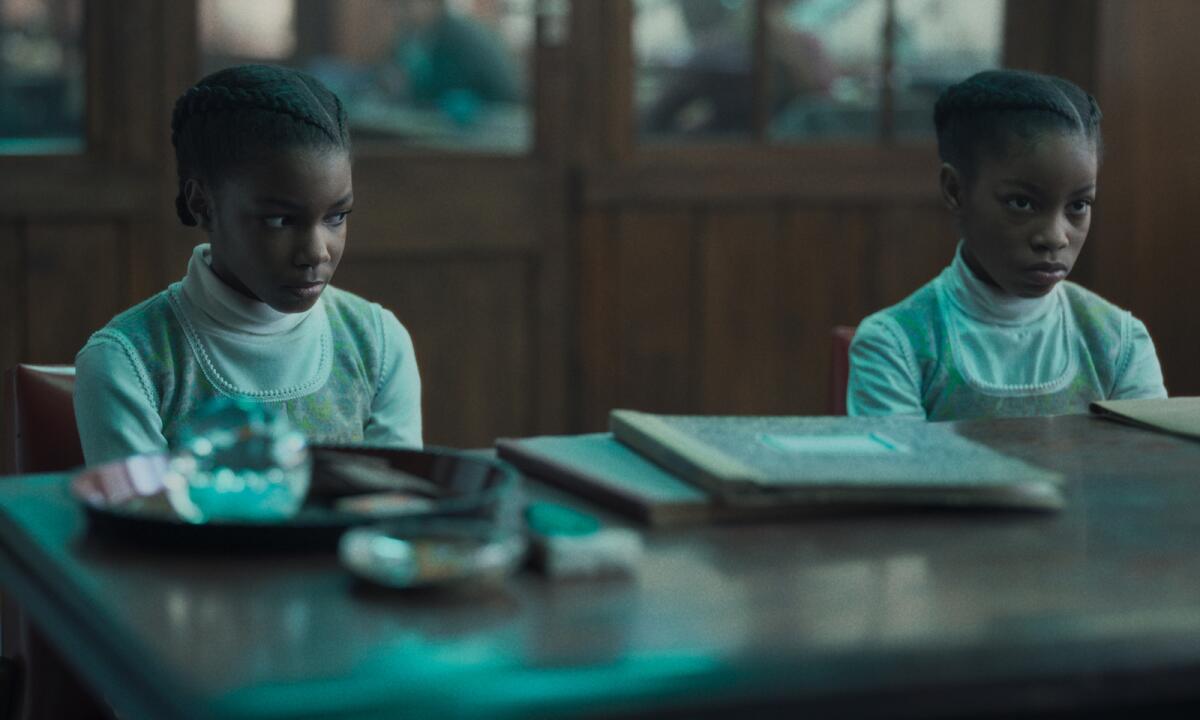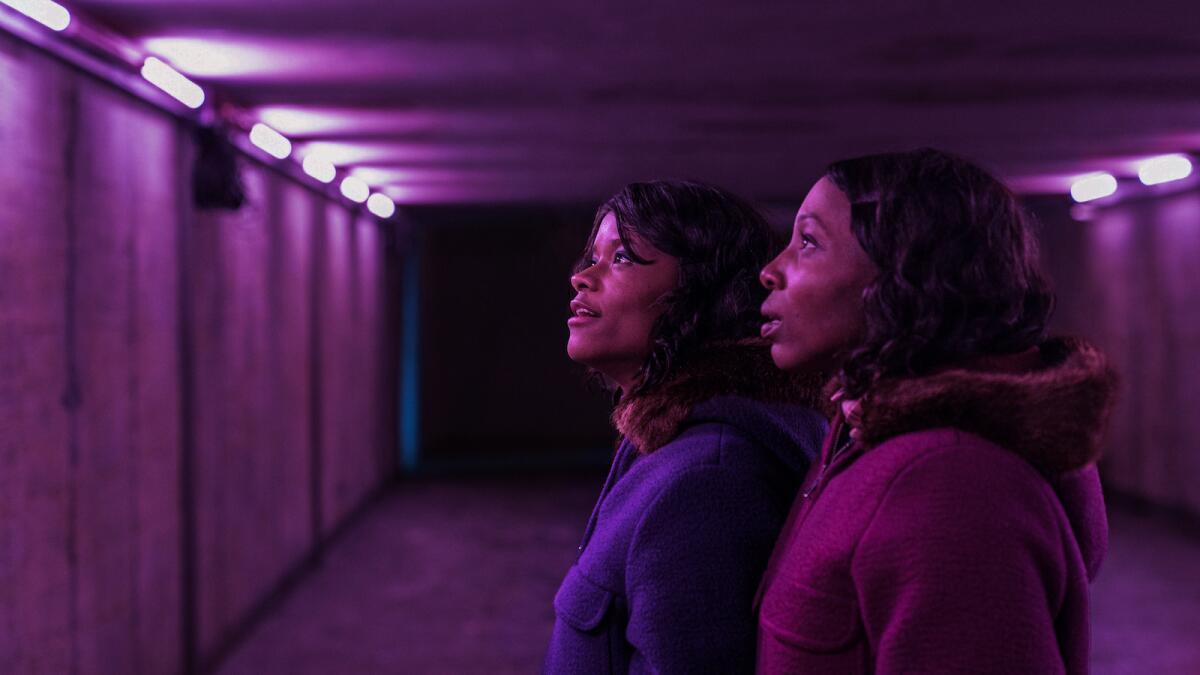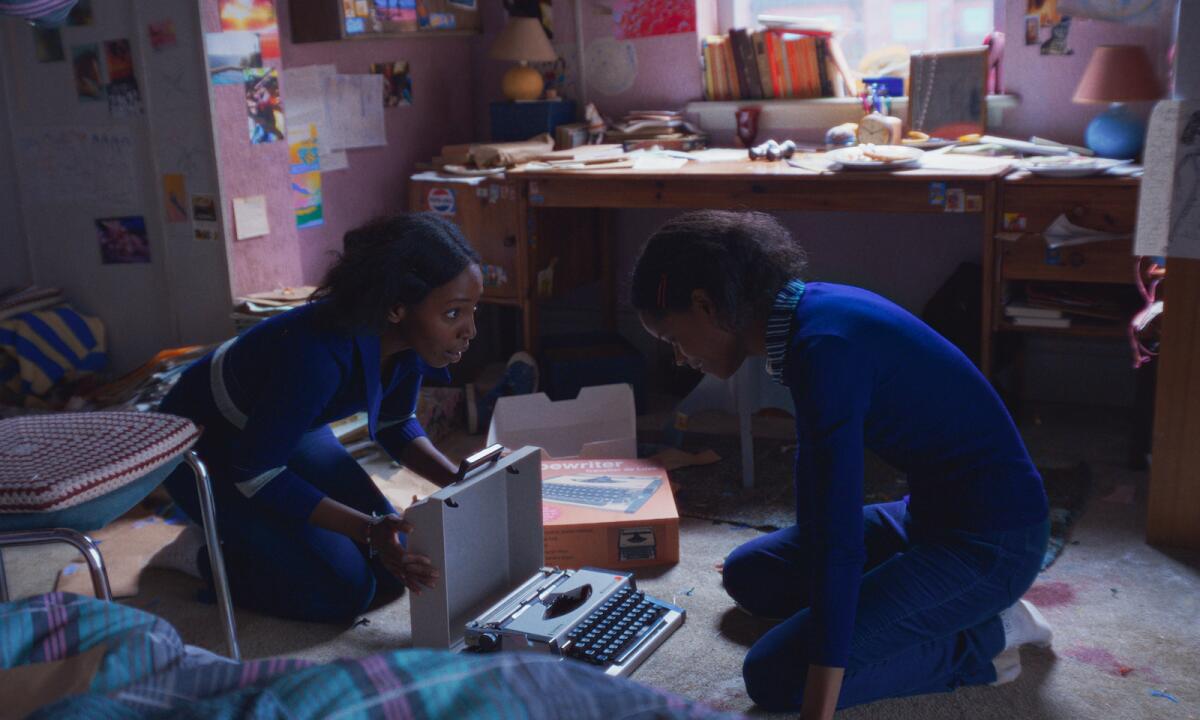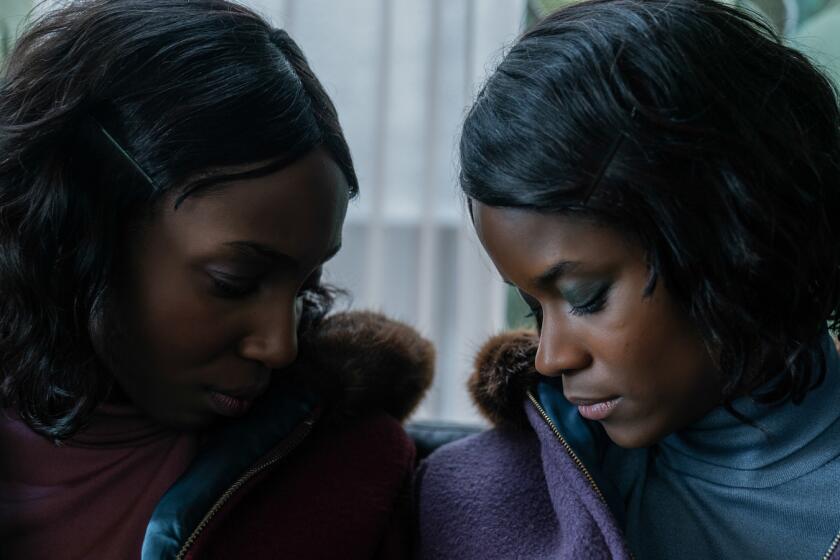Here’s the true story behind the unique bond of ‘The Silent Twins’

London — Twins are frequently portrayed onscreen as a novelty, or even as creepy. But in director Agnieszka Smoczyńska’s “The Silent Twins,” based on the true story of June and Jennifer Gibbons, everyone involved wanted to ensure that a sense of humanity came through in their representation of the identical sisters who were beaten down by a system that refused to understand them.
The twins, who notably began to refuse to speak to anyone except each other from an early age, were considered strange by their community and the British press, but Smoczyńska wanted to showcase how the twins did express themselves, through the art they created and the novels they wrote. The film hits video on demand on Tuesday, following a theatrical run and its world premiere at this year’s Cannes Film Festival.
“For me as a director, [it] was very important to portray them as artists,” says Smoczyńska. “And I didn’t want to make just normal biopic drama because it has no interest to me. That’s what I was really intrigued and inspired by — that June and Jennifer decided not to communicate in a verbal way with the outside world. But they chose writing words and decided to communicate with the outside world through their writings.”
June and Jennifer, played in the film by Letitia Wright and Tamara Lawrance, were born in 1963 to Barbadian immigrants, who had moved to England as part of the Windrush generation. In 1974, they relocated to Haverfordwest, Wales, becoming the only Black family in town. The twins became increasingly withdrawn and after committing a series of petty crimes, the duo were eventually institutionalized in Broadmoor Hospital, where they were locked up for 11 years.
“Black Panther’s” Letitia Wright and Tamara Lawrance are siblings who grow up communicating only with each other in the drama “The Silent Twins.”
At the time, the Gibbons sisters were vilified by the press and treated as mentally ill outcasts. It wasn’t until Sunday Times investigative reporter Marjorie Wallace, who had followed their trial, began visiting the twins in Broadmoor that someone actually listened to their version of the story. The pair became the subject of Wallace’s 1986 book “The Silent Twins,” which drew on interviews, diary entries and observation to recount the unlikely tale.
Screenwriter Andrea Seigel, who first discovered the story during a meeting with Shondaland’s Betsy Beers in 2006, stayed as true to the real circumstances as possible, depicting the twins’ childhood and years in Broadmoor. While the script compresses some characters and timelines, it is generally accurate and has June’s blessing (Jennifer died in 1993).
“I was very concerned with the truthfulness of everything,” Seigel notes. “Because I think it’s an incredible responsibility to handle a real person’s story.”
“The movie is not exactly a copy of June and Jennifer‘s life; it’s the interpretation of their life,” Smoczyńska adds. “Of course, Marjorie’s book is very deep. It’s very precise and very detailed. And when I was working on the movie and I was working with my team, we studied everything that was on the internet and everything that was [in] Marjorie’s book. We [did] huge research. But it’s not a documentary drama. This is fiction.”
Here Smoczyńska, Seigel, Wright and Wallace discuss some of the true, and less true, aspects of the movie. While “The Silent Twins” adheres closely to known real-life events, some spoilers for the film may follow.
Casting identical twins
June and Jennifer were identical, however, the two sets of actors who play them in “The Silent Twins” are not. Originally, Smoczyńska considered using CGI so that Wright, who is also an executive producer, could play both sisters. Eventually, though, the filmmakers came to the conclusion that there needed to be a tangible relationship between the characters. Leah Mondesir-Simmonds and Eva-Arianna Baxter were cast as the younger versions, while Lawrance was added as Wright’s counterpart.
“We met real twins during the auditions and during the casting process, but what I was looking for in terms of the thinking product of this movie, and was crucial to me, was the chemistry between June and Jennifer,” Smoczyńska says. “When you want to tell the story about their relationship, which is very rich, powerful, strong, and the dynamic changes a lot, I decided, ‘No, it’s not the most important [thing] to cast twins.’”

Becoming selectively mute
While June and Jennifer had the ability to speak, and in fact did speak to Wallace and a few others, they made a pact not to communicate with most people, including their family, at age 3. The longer they went without speaking, the more they felt they had to stay silent.
“It gradually grew to, like I say in my book, a bit like a nursery game that they started to play,” Wallace says. “But like a lot of nursery games, they can become very sinister. And in this case, they discovered this power they had against the rest of the world. That together they formed a real power base. And then they couldn’t give that up.”
“I think it was also a little bit physically tough to talk,” Seigel adds, noting that both had a speech impediment. “And at some point, their parents had been coaxed into doing surgeries for them, which made it painful to talk. But they completely had the ability to talk, and when they were alone in their room — and then occasionally high and alone with guys — they were chatterboxes, apparently.”
To create unusual speaking voices, Wright and Lawrance worked with dialect coach Hazel Holder. The goal was to get to the truth of why the twins sounded the way they did.
“We studied and we listened very closely to how June would discuss when they would be quiet and when they would speak,” Wright explains. “And we learned very early on from the research that we did in the book that they had a speech impediment, and that speech impediment stopped certain words to come out clearly. But they still had to navigate speaking to each other in a way that they could understand. So it was a lot of technical work.”
Over the years, because they didn’t communicate with the world, the twins were repeatedly diagnosed by doctors and specialists. However, Wallace, who is also the founder of British mental health charity SANE, doesn’t believe that those diagnoses were accurate.
“In Broadmoor, they were diagnosed as possibly having schizophrenia,” Wallace says. “I challenged the psychiatrists on that. I know a lot about schizophrenia because I set up SANE, which was originally for schizophrenia. I said, ‘Have you read what they’ve written? None of what they’ve written here is psychotic or is about schizophrenia.’ But they were still given antipsychotic drugs in Broadmoor. They were very misjudged.”
Seigel adds, “You can’t remove the complexity of their twinship from the diagnosis. And so we can’t say it’s schizophrenia because you have to look at the way in which these twins were so interlinked — that it’s a completely different scenario than just that they were having visions or imagining scenarios. Something was really going on between them that was really unusual.”

Going from artist to criminal
For the film, Smoczyńska created colorful stop-motion-animation sequences to depict scenes from the twins’ novels, which they wrote in their teenage years. June’s novel, “Pepsi-Cola Addict,” was published by a vanity press that has since gone defunct. It’s difficult to get a hold of the original — Seigel hired someone to scan a photocopied version found in a library — but it has since been reprinted in a limited edition with a new introduction by June. Jennifer’s work, “The Pugilist,” was never published, but, according to Smoczyńska, will now find its way to bookshelves, thanks to the attention from the film.
As June and Jennifer got more immersed in their writing, they became obsessed with understanding romance. That led to them venturing out from their bedroom and engaging in drugs and sex with a pair of local expat American brothers. In 1981, the sisters committed several crimes, including shoplifting and arson. During their trial, the twins were found guilty of 16 counts of burglary, theft and arson and given an indefinite sentence at Broadmoor at age 19.
“It was what would [be] the equivalent of a teenage juvenile behavior,” Wright says. “Just trying to explore another side to themselves they didn’t know how to fully navigate. I think it was trying to be adventurous to feed their books, feed their novels that they were writing, and it went too far. … It went too far to the point of [the authorities] saying, ‘I think it’s best to lock them away indefinitely.’ Which is what you will see in the film.”
For Wallace, who remains close with June, “The Silent Twins” is a way of gaining exposure for the injustice of the situation. Although she campaigned for them to be released from Broadmoor, no psychiatrists were willing to accept them. And the twins’ relationship meant it was challenging both for them to be together and for them to be apart. Ultimately, Wallace hopes the film generates more empathy for people considered to be outside the norm.
“I hope that this film teaches anybody who’s in the psychiatric world, or actually any of us, that when you come across people who may have quite bizarre behavior that there is a soul, as June would say, underneath, and it’s much more complex,” Wallace notes. “And you must always listen to what that person has to say, to read what they write and value the insights that you can gain from people who you might just pass over and say, ‘Oh, well, they’re a bit of a waste of time.’ I think this film will do that.”
Setting her sister free
The most mysterious aspect of the twins’ story, which is touched on at the end of the film, is Jennifer’s death. In the weeks leading up to June and Jennifer’s release from Broadmoor, in 1993, Jennifer began telling Wallace that she was going to die.
“They had decided that the moment they left Broadmoor, one would have to die to liberate the other,” Wallace remembers. “They could not live together, they could not live apart. They would truly liberate one of them, so the other had to die. And it was decided that Jennifer had to die. June was the more outgoing, the more able, [and] Jennifer was probably the one who was much more mentally disturbed, and they had decided she would have to die.”
Shortly after leaving the hospital, Jennifer fell into a coma, and by that evening she was dead. Although she had acute myocarditis, there was no evidence of a cause of death. June has since gone on to lead a relatively normal private life and believes that Jennifer sacrificed herself for the greater good.
“I talked to June about this a lot,” Wallace says. “Actually, a few months ago. I said, ‘Well, why do you think that Jennifer died?’ And she said, ‘I don’t know. But she had to die. That was our destiny.’”
“I follow June’s belief, and June’s belief is strongly that Jennifer decided that if they were going to get out of Broadmoor, if June was ever to have any hope at any kind of successful acclimation to society, that Jennifer could not be around,” Seigel adds. “So it’s June’s very, very strong belief that Jennifer shut down her body and left this world in order that she could continue. … In some sense, it is perhaps true that Jenny gave June a gift, if you want to think about it in some spiritual way. That perhaps it was an act of mysterious love. But I love the fact that you just can’t really answer what happened between those two.”
More to Read
Only good movies
Get the Indie Focus newsletter, Mark Olsen's weekly guide to the world of cinema.
You may occasionally receive promotional content from the Los Angeles Times.









